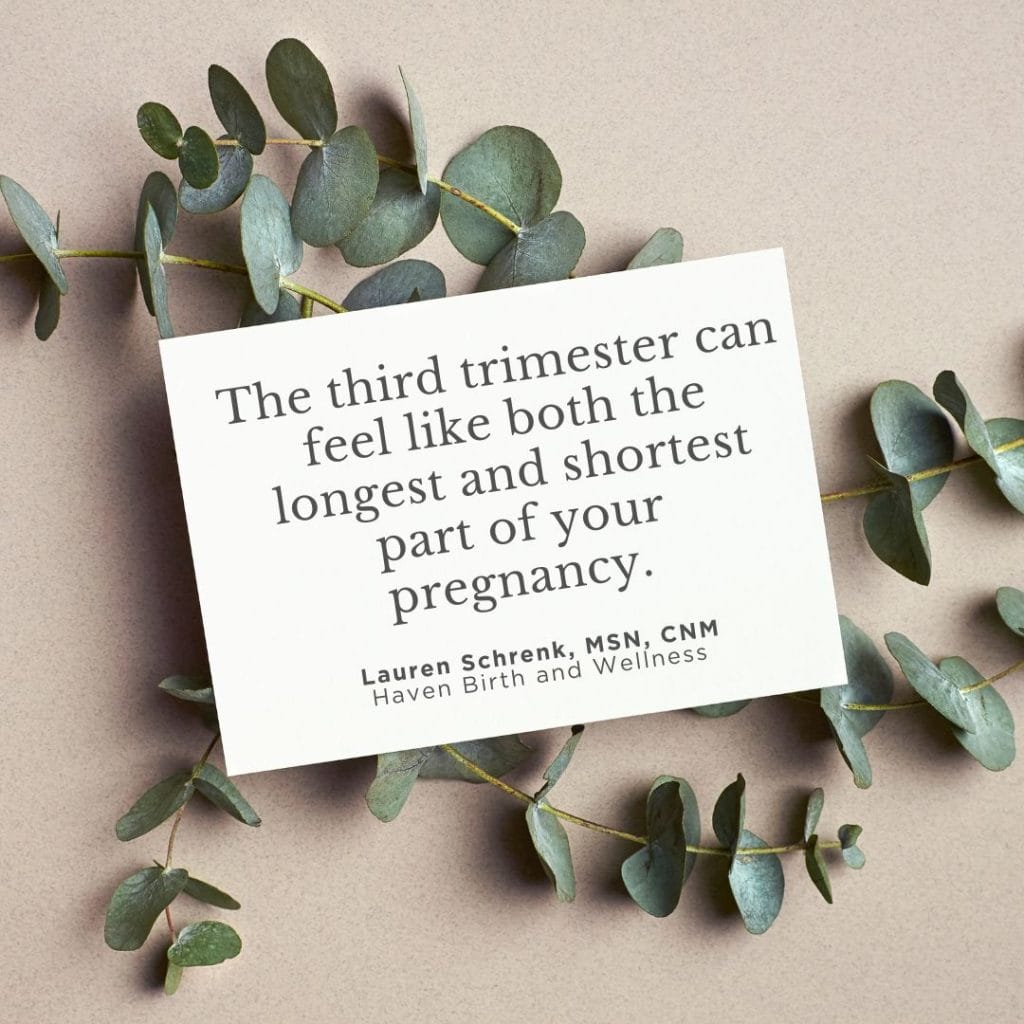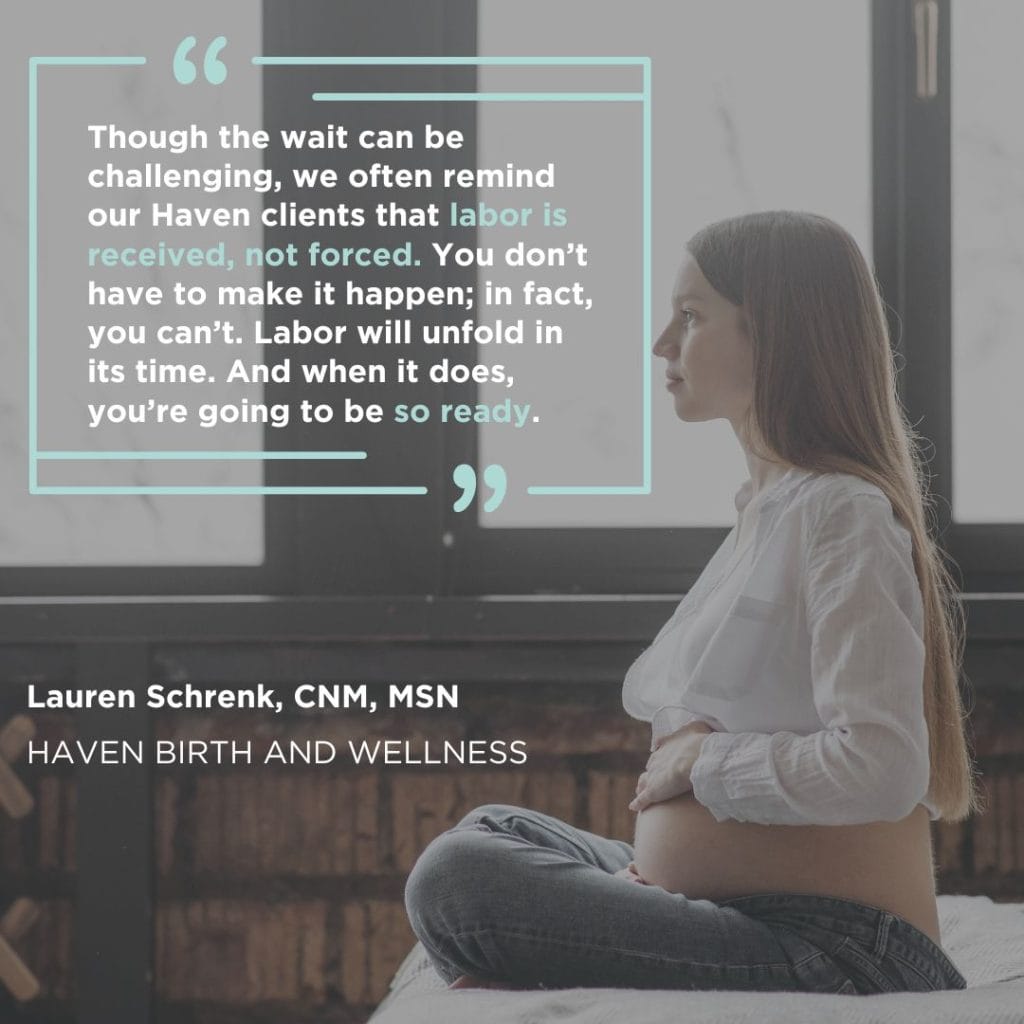

The third trimester can feel like both the longest and shortest part of your pregnancy. You’re so close to meeting your sweet baby, yet there’s still so much happening in your body and so much to prepare for.
As a certified nurse-midwife, I love walking alongside families during this final stretch. It’s a time of deeper connection, intentional planning, and honing in on what you need to feel strong, calm, and confident for the big day.

What Happens During the Third Trimester?
The third trimester includes everything from 28 weeks onward. During this time, your baby is growing fast, your body is doing a lot of hard work, and we begin seeing you more frequently — typically every one to two weeks.
Of course, third trimester appointments continue to monitor you and your baby’s well-being. We talk about how you’re feeling, what symptoms you’re experiencing, and you and your baby’s vitals. We measure growth and listen to that precious little heartbeat. But at this stage we also begin layering in conversations and preparations unique to the third trimester.
Third Trimester Prenatal Care: What to Expect
Some of the specifics to expect in your third trimester prenatal care include:
More Focus on Birth Prep
- At Haven, we start conversations about preparing for home birth, covering logistics, comfort measures, and what to expect when labor begins.
- Since many parents take a birth class during this time, we often talk through that experience and discuss any questions that come up.
Breastfeeding Discussions
- If you plan to breastfeed, we check in about any concerns or goals related to nursing.
- We often recommend a prenatal visit with a lactation consultant to get a jumpstart on your knowledge before baby arrives.
Monitoring Baby’s Position
- At every third trimester visit, we monitor how baby is settling into your pelvis as your due date nears.
Repeat Lab Work
- Current recommendations suggest repeat HIV and syphilis (RPR) screening around 28 weeks, as well as an up-to-date complete blood count (CBC) to check for anemia since iron is crucially important at this time.
- At 28 weeks we test for gestational diabetes with Fresh Test, a cleaner, organic alternative to traditional glucose testing with a minty lemonade taste. Alternatively, mamas can opt to take their blood sugars at home for two weeks to monitor how their body is processing glucose.
- If needed, we may discuss helpful changes to diet, such as ways to increase iron intake.
- At 36 weeks, we also offer a simple group B strep (GBS) test.
36-Week Home Visit
- We visit your home to get a feel for the space and talk through your birth preferences and setup. As much as possible, we want to get on the same page so you’re free from lots of questions on the big day.
- We review the signs of labor, when to call us, and what to expect.
Common Third Trimester Experiences (and What You Can Do)
Since so much is happening physically during the third trimester, it’s helpful to know what’s common and how you can support your body through it.
Braxton Hicks Contractions
Braxton Hicks contractions are a perfectly normal way for your uterus to “practice” and prepare for labor. They usually involve a sensation of tightening or pressure that comes and goes but aren’t typically painful. They may be even less intense and frequent in first pregnancies.
Our best suggestions for supporting your body through Braxton Hicks are to stay hydrated, rest, and take a warm Epsom salt bath.
Shortness of Breath
As your baby grows and begins to press into your lung space, you might find it harder to take deep breaths. This is normal, but chest pain isn’t. If you experience chest pain, seek emergency care (more on this below).
Frequent Urination
Again, your baby takes up more space during the third trimester, causing some interesting symptoms. You’ll likely need to pee more often as your bladder experiences increasing pressure and reduced capacity.
Swelling
Some swelling in your hands and feet that improves with rest is common and normal during the third trimester. But puffiness all over — especially when paired with other symptoms — may be a cause for concern. When in doubt, always reach out to your provider for a discussion (see more below).
Insomnia
Whether it’s waking to pee, hormonal shifts, blood sugar drops, or just general discomfort, sustained sleep can become elusive in the third trimester. Gentle aids like Wishgarden’s sleep tincture for pregnancy, which we offer at Haven, or Epsom salt baths may help you relax and stay or return to sleep.
Leg Cramps
No one loves a middle-of-the-night leg cramp! In pregnancy, these common symptoms don’t come from one single cause, but can stem from changes in blood circulation, stress on your muscles from carrying baby, increased pressure on nerves and blood vessels, acid buildup, and/or low levels of certain electrolytes.
Good hydration, Epsom salt baths, and magnesium supplements, lotions, or sprays before bed can make a big difference here.
Heartburn
This notorious third trimester symptom comes from both hormonal changes and physical pressure. Even as baby presses more into your stomach’s space, progesterone relaxes the sphincter that keeps food (and acid!) out of your esophagus. For relief, try:
- A handful of raw almonds in the moment
- Apple cider vinegar diluted in water before meals to aid digestion
- Papaya or digestive enzymes to aid digestion
- Sleeping propped up
- Avoiding heavy meals before bed
Varicose Veins
Varicose veins are a common result of multiple factors in the third trimester. First, pregnancy nearly doubles your blood volume while pregnancy hormones relax your vessel walls, creating greater opportunity for blood pooling. Increasing weight and pressure also reduce effective circulation.
To relieve the discomfort and improve circulation, consider wearing compression socks or stockings if the problem is in your legs, or a support girdle if you experience symptoms in the groin area. Elevating your legs after standing for an extended time can also help, as can Epsom salt baths.
Hemorrhoids
Hemorrhoids, caused by constipation, straining, hormonal changes, and increased pressure on pelvic veins, are fairly common by the end of the third trimester.
To prevent hemorrhoids or reduce symptoms, focus on measures to reduce constipation and soften your stool: eat more fiber, drink more fluids, take magnesium (citrate for more severe constipation), and try gentle stool softeners if needed. To manage discomfort, we suggest H Salve, witch hazel, or Preparation H. We also offer a specially made hemorrhoid cream in our office.
When to Call Your Midwife or Provider: Signs of Possible Complications
Your body will tell you when something’s not quite right, so be sure to listen to it. If you experience the following symptoms, call your provider so we can check that both you and baby are healthy:
- Preeclampsia Symptoms: Vision changes, persistent headaches, upper right abdominal pain, or sudden swelling could indicate preeclampsia and need evaluation.
- Preterm Labor Symptoms: Painful contractions or period-like cramps could indicate preterm (before 37 weeks) labor, especially if they begin organizing or increasing in frequency.
- Ruptured Membrane Symptoms: When your water breaks prematurely, you may experience either a sudden gush or a slow leak of thin, clear or blood-tinged fluid. If you’re unsure, try lying down for 30 minutes, then standing. If you continue to leak, it’s likely your water.
- Blood Clot Symptoms: Swelling, pain, redness, and/or heat in a limb, especially your leg, are signs of deep vein thrombosis and need immediate medical care. A clot that travels to your lungs — also called a pulmonary embolism — will cause chest pain and/or shortness of breath and needs urgent treatment.
Remember, never feel embarrassed or nervous about contacting us if something feels off. We want to hear from you. You and your baby are our priority, and you’re never bothering us!
Third Trimester Tips: Supporting Yourself Through the Final Stage
The third trimester can be a challenging but rewarding season of pregnancy, bringing growth physically, emotionally, and mentally. In this time, I always tell mamas to keep three things in mind:
- Stay hydrated: It helps with so many common symptoms and overall pregnancy health.
- Prioritize rest: Your body is working hard, with more work ahead.
- Be patient: Baby will come one day.

Though the wait can be challenging, we often remind our Haven clients that labor is received, not forced. You don’t have to make it happen; in fact, you can’t. Labor will unfold in its time. And when it does, you’re going to be so ready.
You’re strong. You’re capable. You were made to do this beautiful job.
And we’re here with you for every step.

Lauren Schrenk is a midwife at Haven Birth & Wellness, dedicated to providing holistic, community-based care. With a deep passion for women’s health and natural birth, Lauren focuses on empowering women through informed choices and personalized care. She is excited to be part of Haven's mission to support families during such pivotal moments in their lives.
Originally from Georgia, Lauren now lives in Nashville with her husband, golden doodle, and their sweet daughter. Outside of midwifery, Lauren enjoys hiking, camping, traveling, and exploring Nashville’s vibrant community.
